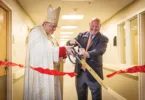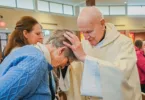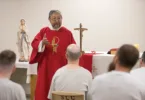by Jane Graves
LAWRENCE — During the first week of January, Jeanette Collier was asked to deliver some food to a home in Lawrence.
When she arrived, she found a 10-year-old boy there — alone, and with nothing to eat.
Collier is the Human Services coordinator for the East Central Kansas Economic Opportunity Corp. (ECKAN) of Douglas County, a social service agency and local food pantry. She was able to help that boy and others like him thanks in large part to an effort called the Just Food program, which began food collections in 2006.
Just Food is a volunteer effort of Lawrence churches and pantries, which provides ECKAN with a regular supply of food donations.
“There were times,” explained Collier, “when I’d have to shut my pantry for three months because there was no food.”
But no longer.
“The Just Food program has really, for the most part, meant that we always have food in the pantry,” she said.
Since the advent of the Just Food program, in fact, the pantry has to close for lack of food only once — last summer — and then for only a week.
Like June and July, said Collier, January and February are typically lean months for food donations. Despite the generosity of holiday season donors, pantries are seriously depleted by the new year.
When Lawrence’s Corpus Christi parishioner Ann Weick, retired dean of the School of Social Welfare at the University of Kansas, set out to solve this feast-or-famine approach to stocking a food pantry, the Just Food program was the result.
“It seemed to me what was missing was a consistent supply of food to the food pantries,” Weick said. “One of the things I feel very strongly about is that hunger is a solvable problem, [especially] in a local community like ours. We have plenty of food, and it’s a matter of getting it to people that need it in a manner that is respectful.”
Weick started out by contacting the local pantries and asked them to coordinate their efforts, becoming partners in distributing donations. All the food collected would be delivered to one central collection pantry, ECKAN, and then equally distributed among the partner pantries. Four of the nine pantries chose to participate.
Weick said she then received the support of Father Mick Mulvany, pastor of Corpus Christi Parish, in initiating the food collections. His efforts were key to the successful implementation at the parish level, she said, because of his ability to educate parishioners on the problem of hunger, as well as to motivate them to commit to regular monthly donations.
Through her research, Weick discovered that a donation of a single food item, while appreciated, would not be sufficient to sustain the pantries.
The Just Food program, therefore, asks participating parishioners to commit to a contribution of enough nonperishable food items once a month to provide a complete meal for a family of four.
“I will say Corpus Christi parishioners respond to that in a very generous way,” Weick said.
After the influx of donations received from Corpus Christi parishioners, Weick asked other churches to commit to regular food collections, ideally once each month. St. John the Evangelist in Lawrence and the St. Lawrence Catholic Campus Center at the University of Kansas, along with nine other churches of various denominations, are now participating.
“The coordinated effort has really struck a [chord] with community donors because there’s always concern about duplication; there’s always confusion,” Collier said. “Donors now know they can bring it to ECKAN, and we will distribute the food or use the funds that are contributed to us to purchase the food for our other partnering pantries.”
Collier and Weick said the coordinated effort of the Just Food program has also helped in securing assistance from two grocery stores, which hold check-out donation drives, and in becoming the Gleaner Program recipient of unsold produce at the Lawrence Farmers’ Market.
Despite these successes and an increased supply of food, the problem of community hunger continues to be an issue, especially as the number of area households experiencing food insecurity continues to grow.
Mary Donnally, who coordinates the volunteer efforts at Corpus Christi along with her husband Reaumur, said the perception is that individuals and families in need are able to receive enough food from the pantries to last for an extended period. In reality, these people receive only “one to two bags of groceries per month.”
“In this country, and especially in this area,” Collier added, “people have a hard time getting their head around the fact that there are food insecure households. There are kids who are hungry; there are adults out there who are hungry.”
“I’ve had adults come into my pantry and open up cans of food and literally consume it right there because they haven’t eaten for a few days,” she said. “But it’s hard for people to get a grip on that, especially being from the Heartland and being in the breadbasket [of the nation].”
But Weick doesn’t believe that participation in the Just Food program is as much charity as it is an exercise in social justice.
“We’re giving something that is really a matter of social justice,” she said, “an expectation that we who have, have an obligation to share.”
For information on the Just Food program, contact Collier at (785) 841-3357 or send her an e-mail at: laweckan@ sunflower.com.






